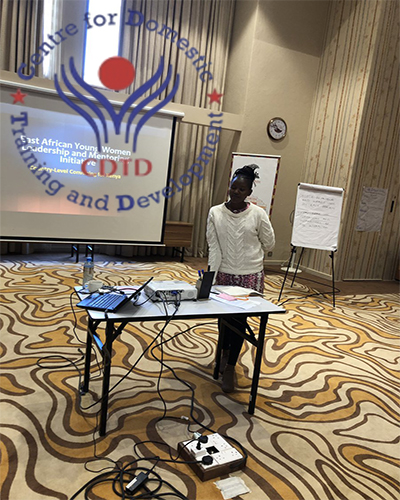- Program: CDTD Initiatives
- Location: Nairobi, Kenya
- Facilitator:CDTD
- Catetory: Advocacy
- Time: Since 2001
Information
Program Approaches & Outcomes
CDTD has endeavored to dignify domestic work using a 5 pronged approach of Protection, Skills Training, Economic Empowerment, Mobilization, and Advocacy.
- Protection – The shelter program – Talia Agler Girls Shelter, is CDTD’s protection arm and is dedicated to providing abused girls and young women (between 0-25 years) laborers as well as victims of human trafficking with services necessary for their recovery and social reintegration. Other shelter’s activities include carrying out interventions in incidences of rights violations, including violation of SRHRs. It also includes providing temporary {safe} shelter for SGBV survivors, undertaking employer-employee mediation, and enabling aggrieved Domestic Workers/vulnerable women and girls to access justice by assisting with reporting – either through Labour Offices or to the Police and assisting with follow up. Using a 4R approach of: Reach, Rescue, Rehabilitate and Reintegrate, victims are provided with shelter, counseling, medical and other services depending on their security concerns – those with heightened security risks are protected accordingly. Other than the main shelter program, CDTD runs a transitional shelter as an exit strategy from the main shelter. The beneficiaries are prepared for reintegration into their communities under the transitional house. Since they are mostly teenage mothers, a full-time childminder takes care of their children as they attend their vocational and tertiary training and when they are introduced into the world of work. They gradually set up their lives and live with their children and fend for themselves without CDTD’s continued support. The shelter has served over 700 girls and women from Kenya and other regions from as far wide as Nepal, Burundi, Ethiopia, and Uganda.
- Economic Empowerment – CDTD has run a successful job placement program that connects well trained domestic workers to employers for over 15 years. In the past 3 years, more than 500 domestic workers were placed in permanent or temporary employment. The trained young women are matched with the labor market opportunities through local job placements. Over 5,000 trainees have demonstrated increased economic reliance and independence as a result. CDTD is currently piloting its’ software application that connects domestic workers with employers in Kenya. The digital platform acts as a resource center for both domestic workers and employers as well as create diverse job opportunities for the beneficiaries.
- Mobilization and Advocacy: – We fight for the rights of domestic workers and migrant populations under the Domestic Workers Transformation Program. CDTD has successfully lobbied for the adoption of the curriculum for Homecare Management Training and, recently, a curriculum for training young women destined for migrant domestic work in the Middle East; NB we trained over 4000 migrant Domestic Workers using the curriculum in 2019. Under Advocacy, we have also been working towards enhancing organizing and advocacy capabilities for Domestic Workers. We recently began mobilizing Domestic Workers into Social Action Groups {towards collective voice and action/collective bargaining} within strategic locations in informal settlements and low-income neighborhoods. From these centers {known as Homecare Hubs}.
Outcomes
- 15,000 trained Domestic Workers enrolled into CDTD’s online employment platform in 5 years
- A sustainable Domestic Workers’ Movement providing domestic workers with a platform to enable collective voice in articulating their concerns and aspirations
- Harmonized collective actions and activities in pursuit of the goals of the Domestic Workers’ Movement in solidarity with other local and global movements and social change efforts
- Enhanced ability to define problems and to identify tentative solutions, resulting in enhanced effectiveness in addressing underlying and cross-cutting issues that affect domestic workers
- Strengthened capacity of domestic workers to participate in mainstream development processes and to work with various government and community stakeholders in actions that will further the movement’s agendas and improve the welfare of domestic workers
- Social media platforms and an SMS network to empower domestic workers socially, enhance access to information, and enhance their ability to influence policy, and to effect social change.
In the next 5 years, CDTD envisions to;-
Have created a reliable employment platform for over 15,000 domestic workers and directly impact over 30,000 households both from the employees and employers communities.
Enhance livelihoods and employability for well trained domestic workers and hence creating their path to self- sufficiency.
Advocate for the integrity and accountability of workers and will expose them to a wider employer base as well as create a support system for both employees and employers.

